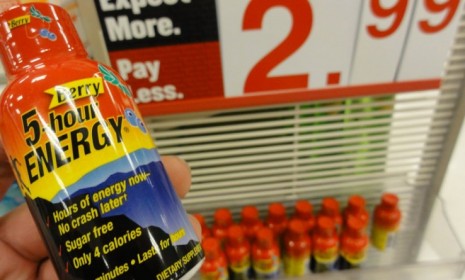Can 5-Hour Energy drink kill you?
The popular energy shot is cited as a potential cause of 13 deaths in the last four years. Is it really that dangerous?

A free daily email with the biggest news stories of the day – and the best features from TheWeek.com
You are now subscribed
Your newsletter sign-up was successful
5-Hour Energy: "Feel it in minutes. Lasts for hours." The 2-ounce energy "shot" might also be dangerous, according to the Food and Drug Administration (FDA), which is investigating 5-Hour Energy after it was mentioned in a "particularly striking" number of death filings in recent years. This comes just three weeks after the agency launched a similar investigation into Monster Energy Drinks. Highly caffeinated beverages are the fastest-growing type of soft drink in the country, but could these pick-me-ups put you six feet under? Here's what you should know:
What exactly do these filings say?
The FDA says it's received reports of 13 deaths over the last four years citing 5-Hour Energy as a potential cause. And it's not just deaths: Since 2009, the drink has been mentioned in 92 "adverse event" filings with the FDA, 33 of which involved serious or life-threatening injuries like heart attacks. One case supposedly lead to "spontaneous abortion."
The Week
Escape your echo chamber. Get the facts behind the news, plus analysis from multiple perspectives.

Sign up for The Week's Free Newsletters
From our morning news briefing to a weekly Good News Newsletter, get the best of The Week delivered directly to your inbox.
From our morning news briefing to a weekly Good News Newsletter, get the best of The Week delivered directly to your inbox.
Does this mean 5-Hour Energy is deadly?
Not necessarily. Filing a report about a product with the FDA doesn't mean the substance is the cause of an incident. It simply prompts the FDA to look into the matter, which can be a difficult task. As The New York Times notes, "such reports can be fragmentary in nature and difficult to investigate." The FDA stresses that it has no concrete evidence, as yet, linking 5-Hour Energy to the deaths.
What exactly is in this stuff?
5-Hour Energy is sold as a two-ounce "shot." The company does not disclose how much caffeine is in each shot, but different consumer reports estimate one bottle contains somewhere between 200 and 215 milligrams of caffeine, "twice as much as your average cup of coffee and almost three times as much caffeine as a small can of Red Bull," notes Taylor Berman at Gawker. Though that's still far less than a fatal dose of caffeine, some people have unusual sensitivity to the drug. 5-Hour Energy also contains very high levels of certain B vitamins and a substance called taurine, The New York Times reports. The product’s label recommends that it not be used by pregnant women or children under the age of 12 and that consumers drink no more than two shots a day, spaced several hours apart.
A free daily email with the biggest news stories of the day – and the best features from TheWeek.com
Is 5-Hour energy the only concern?
No, far from it. The energy drink industry is being put under a microscope for its sketchy labeling, which often doesn't disclose possible health risks. According to Consumer Reports, 11 of the 27 top-selling energy drinks in the U.S. don’t disclose how much caffeine is in their products. Those that do specify caffeine content often underestimate the actual amount. In 2009, more than 13,000 trips to the emergency room were associated with energy drinks, according to the Substance Abuse and Mental Health Services Administration. And just last month, the FDA said it had received five fatality filings mentioning Monster Energy.
What can the FDA do?
They're looking into the reports. "We take every adverse event report seriously," Shelly Burgess, an FDA spokeswoman, tells The Wall Street Journal. Right now, many energy drink companies are allowed to skip FDA regulatory guidelines and forgo disclosing how much caffeine is in their products because they are labeled as "drinks." The agency doesn't have enough scientific evidence to make major changes to these regulations.
What do 5-Hour Energy officials say?
Living Essentials LLC, which distributes the product, stands by their conviction that 5-Hour Energy is not the cause of any of the health problems reported to the FDA. The group says, when used as directed, 5-Hour Energy is safe.
Sources: The New York Times, The Wall Street Journal, Think Progress, Gawker